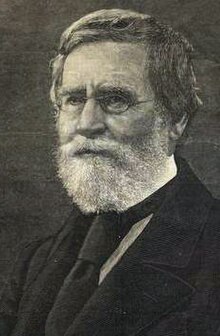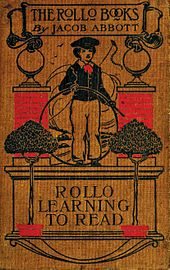Jacob Abbott
Jacob Abbott (born November 14, 1803 in Hallowell ( Maine ), † October 31, 1879 in Farmington , Maine) was an American youth writer and educator .
Life
Abbott came from a family who emigrated to New England from the British Isles in 1640 . His parents were the merchant Jacob Abbot and Betsey Chandler . He attended Hallowell Academy with his four brothers and then attended the prestigious general education Bowdoin College ( Brunswick (Maine) ). There he was particularly interested in the natural sciences, graduating in 1820 with a Bachelor of Arts and becoming a Master of Arts three years later . During his apprenticeship at Bowdoin College, he changed his family name from Abbot to Abbott . Some of his brothers followed suit. In 1820/1821 he was a teacher at the Portland Academy, where he taught the future American poet Henry Wadsworth Longfellow . Abbott then devoted himself to studying theology, which he completed in 1821/1922 and in 1824 at Andover Theological Seminary ( Andover (Massachusetts) ).
1824/1825 was Abbott tutor and 1825-1829 professor of mathematics and natural sciences at established not long ago (1821) and in the city Amherst (Massachusetts) nearby Amherst College . With four faculty colleagues, he researched the teaching conditions of higher education institutions in the United States, but also in Europe. The results of their research, presented in 1826, criticized the Amherst College curriculum as antiquated. More emphasis should be placed on science and modern history, and living languages such as German and French should be taught instead of ancient languages ( Latin , Greek ) . Abbott's proposals met with approval in the beginning and were implemented on a trial basis from 1827, but due to the associated much larger teaching effort and a lack of resources at the college, discontinued two years later. Therefore Abbott gave up his professorship in the same year (1829).
On May 18, 1828, Abbott had married Harriet Vaughan of Hallowell . The marriage had six children. Two sons, Benjamin Vaughan Abbott and Austin Abbott , became eminent lawyers and law writers. Two other sons, Lyman Abbott and Edward Abbott , became prominent clerics and writers.
After leaving Amherst College, Abbott went to Boston with his family and served there from 1829 to 1833 as the director of the Mount Vernon Girls School he founded , which pioneered American women's education. Back then, it was not a given that girls should even have lessons. In Abbott's institution, conventional disciplinary measures such as the otherwise dominant punishment by corporal punishment were hardly practiced, but an attempt was made primarily to achieve a better education of the students by involving them in behavioral measures and appeals to their consciences.
Abbott left Boston in 1833 and pursued a brief spiritual career. In his religious views he was one of the liberal evangelicals . On May 3, 1826, he had already been approved as a preacher by the Hampshire Association . In Roxbury (Massachusetts) he founded the Eliot Congregational Church and worked there as a pastor in 1834/1835. Then he passed this position on to his brother John Stevens Cabot Abbott , went to Farmington, Maine for some time and from then on was mainly active as an author of literature for young people . In 1843 he became a widower. That year he took a break from his literary work to set up and run a school, the Abbott Institute , in New York City with his brothers John Abbott and Gorham Dummer Abbott . He held this post until 1851 and was also director of the Mount Vernon boys school from 1845 to 1848 .
From 1851 Abbott only pursued his literary interests. He married Mary Dana Woodbury in 1853, his second childless marriage . He lived in New York City until 1870 and traveled frequently to Europe. He spent the last years of his life in seclusion until his death (1879) in Farmington, where his brother Samuel Phillips Abbott founded the Abbott School .
Literary work
Abbott's work comprises a total of 180 volumes, most of which were widely distributed. Several of them have also been translated into other languages. Abbott was also the co-author or editor of 31 other books and the author of numerous magazine articles. This is how he achieved international fame. He made his very successful literary debut in 1832 with the first of four volumes of his Young Christian Series . This book saw numerous editions in America and Great Britain and has also been translated into French and Dutch.
Abbott achieved the most enduring fame as a youth writer. As a versatile author, he also wrote biographies, theological books intended for a broad readership and some popular scientific works.
Abbott's writings are didactic and intended to encourage readers to appreciate Christian virtues. This genre includes his Rollo books, published since 1834 (28 volumes, e.g. Rollo at Work , Rollo at Play , Rollo in Europe ), which became particularly popular. The young protagonist Rollo experiences a maturation process in the course of the series and travels around the world with his omniscient Uncle George , imparting elementary facts about geography, history and the natural sciences to the young reader. The Rollo books served one or two generations of American children as models for exemplary behavior and entertainment reading and were in the tradition of the children's book The History of Sandford and Merton (1783 to 1789) by the English writer Thomas Day , which in turn was based on the ideas of Jean- Jacques Rousseau had been influenced.
Other works (selection)
- The Franconia stories. 10 volumes.
- Marco Paul's adventures, 6 volumes.
- Harper's story books. 36 volumes.
- Little learner series. 5 volumes.
Others
The commemorative edition of The Young Christian (New York, 1882) contains a brief biography of Jacob Abbott, penned by his son Edward Abbott. The essay Jacob Abbott, Friend of Children , written by his son Lyman Abbott and published in Silhouettes of My Contemporaries (1921) gives an impression of his personality . The Bowdoin College Library in Brunswick, Maine, also holds many of Abbott's manuscripts and personal papers.
literature
- Edward L. Lach: Abbott, Jacob. In: American National Biography . Volume 1. 1999, p. 27 f.
Web links
- Jacob Abbott , entry in the Encyclopædia Britannica 1911 (English)
- Collected Works (English)
| personal data | |
|---|---|
| SURNAME | Abbott, Jacob |
| BRIEF DESCRIPTION | American youth writer |
| DATE OF BIRTH | November 14, 1803 |
| PLACE OF BIRTH | Hallowell , Maine , United States |
| DATE OF DEATH | October 31, 1879 |
| Place of death | Farmington , Maine , United States |

